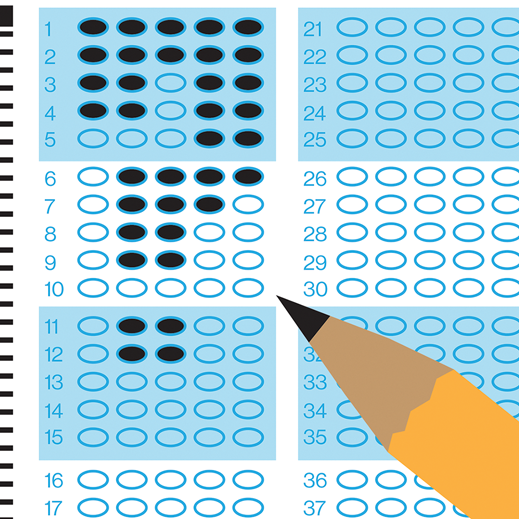Can You Teach Logical Analysis?
In many states, passing a standardized test is necessary to receive a high school diploma. These exams have also been shown to predict students’ future educational attainment, employment, and income.

Such high-stakes tests are designed to measure the knowledge and skills that students have acquired in school—what psychologists call “crystallized intelligence.” However, according to a recent study from MIT neuroscientists working with education researchers at Harvard and Brown universities, schools whose students have the highest gains in test scores do not produce similar gains in “fluid intelligence”—the ability to analyze abstract problems and think logically.
In a study of nearly 1,400 eighth graders in the Boston public school system, the researchers found that some schools have successfully raised their students’ scores on the Massachusetts Comprehensive Assessment System (MCAS). However, those schools barely affected students’ performance on tests that measured working memory capacity, speed of information processing, and ability to solve abstract problems.
The data for the study came from students attending traditional, charter, and exam schools. The researchers calculated how much of the variation in students’ MCAS scores was due to the school that they attended. They found that schools accounted for 24 percent of the variation in English and 34 percent in math. However, the schools accounted for very little of the variation in fluid cognitive skills—less than 3 percent for the three test areas combined.
John Gabrieli, senior author of the study, notes that the findings should not be interpreted as critical of schools that are improving their students’ MCAS scores. “It’s valuable to push up the crystallized abilities, because if you can do more math, if you can read a paragraph and answer comprehension questions—all those things are positive,” he says.
Gabrieli, an MIT professor of health sciences and technology as well as of brain and cognitive sciences, hopes that the findings will encourage policy makers to consider adding practices that enhance cognitive skills, which are seldom explicitly taught. “Schools can improve crystallized abilities, and now it might be a priority to see if there are some methods for enhancing the fluid ones as well,” he says.
Keep Reading
Most Popular
Large language models can do jaw-dropping things. But nobody knows exactly why.
And that's a problem. Figuring it out is one of the biggest scientific puzzles of our time and a crucial step towards controlling more powerful future models.
The problem with plug-in hybrids? Their drivers.
Plug-in hybrids are often sold as a transition to EVs, but new data from Europe shows we’re still underestimating the emissions they produce.
Google DeepMind’s new generative model makes Super Mario–like games from scratch
Genie learns how to control games by watching hours and hours of video. It could help train next-gen robots too.
How scientists traced a mysterious covid case back to six toilets
When wastewater surveillance turns into a hunt for a single infected individual, the ethics get tricky.
Stay connected
Get the latest updates from
MIT Technology Review
Discover special offers, top stories, upcoming events, and more.